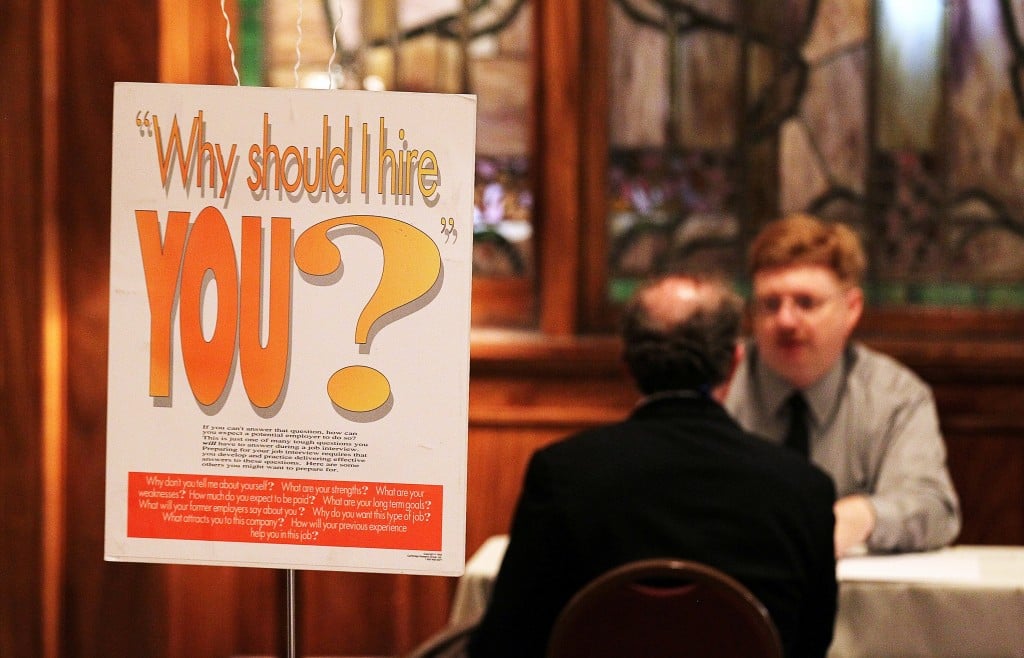
There’s a right and wrong way to answer common interview questions | Photo by Justin Sullivan
the offer before you shake hands with the hiring manager. Being prepared to answer certain generic questions about your goals, experience, and interest in a position is essential if you’re on the hunt for a new position. Flubbing your responses, on the other hand, can send your resume straight to the recycling bin.
Though you’ll likely hear the same questions again and again over the course of your job hunt, it’s still easy to make mistakes, especially if you answer off the cuff or make the mistake of being too honest in your replies. If you want to impress a potential employer, review these five incorrect answers to common interview questions and find out what you should say instead.
1. “Why do you want to work here?”
Wrong answers: “I need a job,” “I want a shorter commute,” or “It seems like a great company.”Yes, you need a job. You may even be willing to beg for one. But instead of focusing on how desperate you are to land a new gig, focus on what attracted you to the company, such as its reputation in the industry or innovative products, and what you can bring to the position. Also avoid discussing personal factors like a shorter commute or better benefits when explaining what encouraged you to apply; you want to make this about how you can help the employer, not how they can help you. Vague responses about how working there seems like an amazing opportunity aren’t likely to help you get the job either, unless you can back them up with additional comments showing you’ve researched the company and how your skills fit with what they do.
You should approach this question as “yet another opportunity for you to not only showcase what you know, but wrap it up with what you can provide skill wise,” Mike Simpson of The Interview Guys wrote in a blog post.
2. What is your greatest weakness?

Don’t lie and say you don’t have any weaknesses | Source: iStock
Job hunters may dread it, but interviewers trot out the “greatest weakness” question frequently. Tempting as it may be, resist the urge to deny having a weakness. For one, it’s not true, and your interviewer knows it. Plus, refusing to admit any weaknesses suggest you’re not very self-reflective and don’t have a good sense of how you can improve as an employee. Almost as bad is trying to pass off an apparent strength, like being a perfectionist, as a weakness, another trick interviewers will see through.
Instead, pick a real weakness to discuss with the interview, career coach Mike Simpson said. Then, explain how you’re working to overcome this weakness. When selecting your weakness, don’t choose one that will take you out of the running for the job (a customer service rep wouldn’t want to confess to not being good at dealing with people), but it should be significant enough to show you can grow and develop in your career.
3. “Why are your leaving your current job?”
Wrong answers: “I hate my boss” or “I’m not getting paid enough.”Your current boss may be a tyrant and the company may be paying you peanuts, but don’t use an interview to vent about those problems. Speaking ill of your current employer, no matter how justified your complaints, reflects poorly on you.
“If you bad-mouth the previous employer to me, I’ll assume you’re going to bad-mouth me to your next employer,” Mary Ellen Slayter, a career expert and founder of Reputation Capital Media Services, told U.S. News & World Report.
Instead of focusing on the negative, talk about how you’re looking for new opportunities to grow, take on new challenges, or better use your skills, or how your current employer’s strategic direction is no longer a fit for your career goals.
4. “What’s your dream job?”

Your “dream job” should be related to the position you’re applying for | Source: iStock
Selling widgets may not be your dream job, but you shouldn’t let the interviewer know that. If a prospective employer asks about your ideal career, don’t wax poetic about your plans for success in a completely unrelated field.
“[I]n general, citing a dream job that has nothing to do with the field you’re applying for can be a bad idea,” according to career expert Alison Green of Ask the Manager. “In a lot of cases, it makes employers think you’re not going to be satisfied with the job they’re hiring for, and/or wonder if you’ve even thought through your interest in their job, and/or think that you’ll leave as soon as a path to your dream job comes along.”
A better way to answer this question is to discuss how the current job aligns with your passions and interests, in addition to putting you on a path to achieving your long-term career goals, preferably with the company you’re interviewing at.
5. “Do you have any questions for us?”
Wrong answers: “Nope!” Or, “What’s the salary for this position?” or “How many vacation days will I get?”If an interviewer gives you the chance to ask questions of your own, seize it. Asking a few thoughtful questions shows you’re interested in the position and were paying attention during the interview. You might ask about how your role would fit in with the rest of the organization or what the interviewer enjoys most about working at the company. But steer clear of questions about salary and benefits, since discussing those issues during an initial interview suggests you’re more interested in what you can get out of a job than whether you’re a good fit for the position.
“Interviewers will want to know if you’re interested in them and their organization, so you should never go to an interview without a list of pre-prepared questions,” Jonathan Burston, founder of the Interview Expert Academy, told The Guardian.
No comments:
Post a Comment